Afghanistan profile - Timeline
- Published
A chronology of key events:
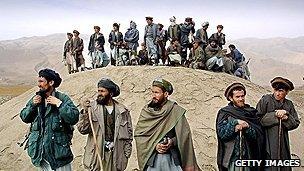
Militia wait for US planes to bomb Taliban positions in October 2001
1838-42 - British forces invade, install King Shah Shujah. He is assassinated in 1842. British and Indian troops are massacred during retreat from Kabul.
1878-80 - Second Anglo-Afghan War. A treaty gives Britain control of Afghan foreign affairs.
1919 - Emir Amanullah Khan declares independence from British influence.
1926-29 - Amanullah tries to introduce social reforms, which however stir civil unrest. He flees.
1933 - Zahir Shah becomes king and Afghanistan remains a monarchy for next four decades.
1953 - General Mohammed Daud becomes prime minister. Turns to Soviet Union for economic and military assistance. Introduces social reforms, such as abolition of purdah (practice of secluding women from public view).
1963 - Mohammed Daud forced to resign as prime minister.
1964 - Constitutional monarchy introduced - but leads to political polarisation and power struggles.
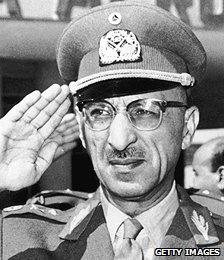
King Zahir Shah, who ruled for 40 years until he was ousted in 1973
1973 - Mohammed Daud seizes power in a coup and declares a republic. Tries to play off USSR against Western powers.
1978 - General Daud is overthrown and killed in a pro-Soviet coup. The People's Democratic Party comes to power but is paralysed by violent infighting and faces opposition by US-backed mujahideen groups.
Soviet intervention
1979 December - Soviet Army invades and props up communist government.
1980 - Babrak Karmal installed as ruler, backed by Soviet troops. But opposition intensifies with various mujahideen groups fighting Soviet forces. US, Pakistan, China, Iran and Saudi Arabia supply money and arms to the mujahideen.
1985 - Mujahideen come together in Pakistan to form alliance against Soviet forces. Half of Afghan population now estimated to be displaced by war, with many fleeing to neighbouring Iran or Pakistan.
1986 - US begins supplying mujahideen with Stinger missiles, enabling them to shoot down Soviet helicopter gunships. Babrak Karmal replaced by Najibullah as head of Soviet-backed regime.
1988 - Afghanistan, USSR, the US and Pakistan sign peace accords and Soviet Union begins pulling out troops.
Red Army quits
1989 - Last Soviet troops leave, but civil war continues as mujahideen push to overthrow Najibullah.
1992 - Najibullah's government toppled, but a devastating civil war follows.

President Najibullah (centre) headed the Soviet-backed regime
1996 - Taliban seize control of Kabul and introduce hard-line version of Islam, banning women from work, and introducing Islamic punishments, which include stoning to death and amputations.
1997 - Taliban recognised as legitimate rulers by Pakistan and Saudi Arabia. They now control about two-thirds of country.
1998 - US launches missile strikes at suspected bases of militant Osama bin Laden, accused of bombing US embassies in Africa.
1999 - UN imposes an air embargo and financial sanctions to force Afghanistan to hand over Osama bin Laden for trial.
2001 September - Ahmad Shah Masood, leader of the main opposition to the Taliban - the Northern Alliance - is assassinated.
US-led invasion
2001 October - US-led bombing of Afghanistan begins following the September 11 attacks on the United States. Anti-Taliban Northern Alliance forces enter Kabul shortly afterwards.
2001 December - Afghan groups agree deal in Bonn, Germany for interim government.
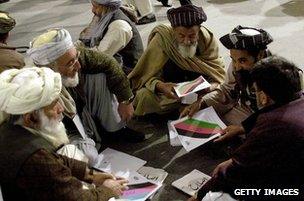
Loya Jirga delegates adopted a new constitution in 2004
Hamid Karzai is sworn in as head of an interim power-sharing government.
2002 January - Deployment of first contingent of foreign peacekeepers - the Nato-led International Security Assistance Force (ISAF) - marking the start of a protracted fight against the Taliban.
2002 April - Former king Zahir Shah returns, but makes no claim to the throne and dies in 2007.
2002 June - Loya Jirga, or grand council, elects Hamid Karzai as interim head of state. Karzai picks members of his administration which is to serve until 2004.
2003 August - Nato takes control of security in Kabul, its first-ever operational commitment outside Europe.
Elections
2004 January - Loya Jirga adopts new constitution which provides for strong presidency.
2004 October-November - Presidential elections. Hamid Karzai is declared winner.
2005 September - Afghans vote in first parliamentary elections in more than 30 years.
2005 December - Parliament opens with warlords and strongmen in most of the seats.
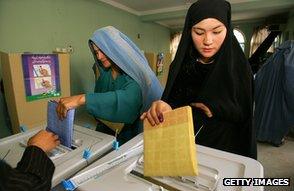
2005 vote: The first parliamentary poll in more than 30 years
2006 October - Nato assumes responsibility for security across the whole of Afghanistan, taking command in the east from a US-led coalition force.
2007 August - Opium production has soared to a record high, the UN reports.
2008 June - President Karzai warns that Afghanistan will send troops into Pakistan to fight militants if Islamabad fails to take action against them.
2008 July - Suicide bomb attack on Indian embassy in Kabul kills more than 50.
2008 September - US President George Bush sends an extra 4,500 US troops to Afghanistan, in a move he described as a "quiet surge".
2009 January - US Defence Secretary Robert Gates tells Congress that Afghanistan is new US administration's "greatest test".
2009 February - Nato countries pledge to increase military and other commitments in Afghanistan after US announces dispatch of 17,000 extra troops.
New US approach
2009 March - US President Barack Obama unveils new strategy for Afghanistan and Pakistan. An extra 4,000 US personnel will train and bolster the Afghan army and police and there will be support for civilian development.
2009 August - Presidential and provincial elections are marred by widespread Taliban attacks, patchy turnout and claims of serious fraud.
2009 October - Mr Karzai declared winner of August presidential election, after second-placed opponent Abdullah Abdullah pulls out before the second round.
2009 December - US President Obama decides to boost US troop numbers in Afghanistan by 30,000, bringing total to 100,000. He says US will begin withdrawing its forces by 2011.
An Al-Qaeda double agent kills seven CIA agents in a suicide attack on a US base in Khost.
2010 February - Nato-led forces launch major offensive, Operation Moshtarak, in bid to secure government control of southern Helmand province.
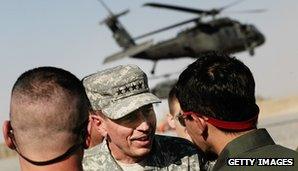
US General David Petraeus in Kandahar: President Obama announced a troop surge in late 2009
2010 July - Whistleblowing website Wikileaks publishes thousands of classified US military documents relating to Afghanistan.
General David Petraeus takes command of US, ISAF forces.
2010 August - Dutch troops quit.
Karzai says private security firms - accused of operating with impunity - must cease operations. He subsequently waters down the decree.
2010 September - Parliamentary polls marred by Taliban violence, widespread fraud and a long delay in announcing results.
2010 November - Nato - at summit in Lisbon - agrees plan to hand control of security to Afghan forces by end of 2014.
2011 January - President Karzai makes first official state visit to Russia by an Afghan leader since the end of the Soviet invasion in 1989.
2011 February - Number of civilians killed since the 2001 invasion hit record levels in 2010, Afghanistan Rights Monitor reports.
2011 April - Burning of Koran by a US pastor prompts country-wide protests in which foreign UN workers and several Afghans are killed.
Some 500 mostly Taliban prisoners break out of prison in Kandahar.
2011 July - President's half-brother and Kandahar governor Ahmad Wali Karzai is killed in Taliban campaign against prominent figures.
2011 September - Ex-president Burhanuddin Rabbani - a go-between in talks with the Taliban - is assassinated.
2011 October - As relations with Pakistan worsen after a series of attacks, Afghanistan and India sign a strategic partnership to expand co-operation in security and development.
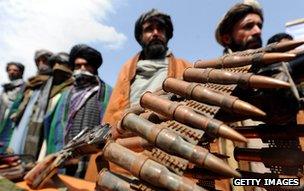
Former Taliban fighters in Herat: Insurgents are waging a fierce campaign against the government
Military pact
2011 November - President Karzai wins the endorsement of tribal elders to negotiate a 10-year military partnership with the US at a loya jirga traditional assembly. The proposed pact will see US troops remain after 2014, when foreign troops are due to leave the country.
2011 December - At least 58 people are killed in twin attacks at a Shia shrine in Kabul and a Shia mosque in Mazar-i-Sharif.
Pakistan and the Taleban boycott the scheduled Bonn Conference on Afghanistan. Pakistan refuses to attend after a Nato air strike killed Pakistani soldiers on the Afghan border.
2012 January - Taliban agree to open office in Dubai as a move towards peace talks with the US and the Afghan government.
2012 February - At least 30 people are killed in protests about the burning of copies of the Koran at the US Bagram airbase. US officials believed Taliban prisoners were using the books to pass messages, and that they were extremist texts not Korans. Two soldiers are also killed in reprisal attacks.
2012 March - US Army Sgt Robert Bales is accused of killing 16 civilians in an armed rampage in the Panjwai district of Kandahar.
2012 April - Taliban announce "spring offensive" with audacious attack on the diplomatic quarter of Kabul. The government blamed the Haqqani Network. Security forces kill 38 militants.
Nato withdrawal plan
2012 May - Nato summit endorses the plan to withdraw foreign combat troops by the end of 2014.
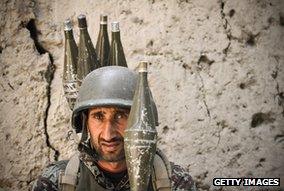
Nato troops will withdraw by late 2014, giving security responsibilities to Afghan forces
New French President Francois Hollande says France will withdraw its combat mission by the end of 2012 - a year earlier than planned.
Arsala Rahmani of the High Peace Council is shot dead in Kabul. A former Taliban minister, he was crucial in reaching out to rebel commanders. The Taliban deny responsibility.
2012 July - Tokyo donor conference pledges $16bn in civilian aid to Afghanistan up to 2016, with US, Japan, Germany and UK supplying bulk of funds. Afghanistan agrees to new conditions to counter corruption.
2012 August - The US military discipline six soldiers for accidentally burning copies of the Koran and other religious texts in Afghanistan. They will not face criminal prosecution. Three US Marines are also disciplined for a video in which the bodies of dead Taliban fighters were urinated on.
2012 September - US hands over Bagram high-security jail to the Afghan government, although it retains control over some foreign prisoners until March 2013.
The US also suspends training new police recruits in order to carry out checks on possible ties to Taliban following series of attacks on foreign troops by apparent police and Afghan soldiers.
2013 February - President Karzai and Pakistan's Asif Ali Zardari agree to work for an Afghan peace deal within six months after talks hosted by Britain's Prime Minister David Cameron. They back the opening of an Afghan office in Doha and urge the Taliban to do the same for talks to take place.
2013 March - Two former Kabul Bank chiefs, Sherkhan Farnood and Khalilullah Ferozi, are jailed for the multi-million dollar fraud that almost led to its collapse and that of the entire Afghan banking system in 2010.
2013 June - Afghan army takes command of all military and security operations from Nato forces.
President Karzai suspends security talks with the US after Washington announces it plans to hold direct talks with the Taliban. Afghanistan insists on conducting the talks with the Taliban in Qatar itself.
2014 January - Taliban suicide squad hits a restaurant in Kabul's diplomatic quarter, the worst attack on foreign civilians since 2001. The 13 foreign victims include IMF country head.
2014 April - The presidential election produces an inconclusive result and goes on to a second round between Abdullah Abdullah and Ashraf Ghani.
2014 June - Second round of presidential election is held, with more than 50 reported killed in various incidents during the vote.
2014 July - Election officials begin recount of all votes cast in June's presidential run-off, as part of a US-mediated deal to end dispute between candidates over widespread claims of fraud.
Election deal
2014 September - The two rivals for the Afghan presidency, Ashraf Ghani and Abdullah Abdullah, sign a power-sharing agreement, following a two-month audit of disputed election results. Ashraf Ghani is sworn in as president.
2014 October - The US and Britain end their combat operations in Afghanistan.
Opium poppy cultivation in Afghanistan reaches an all-time high, according to a US report
2014 December - NATO formally ends its 13-year combat mission in Afghanistan, handing over to Afghan forces. Despite the official end to Isaf's combat role, violence persists across much of the country, with 2014 said to be the bloodiest year in Afghanistan since 2001.
2015 January - NATO-led follow-on mission "Resolute Support" gets underway, with some 12,000 personnel to provide further training and support for Afghan security forces.
Islamic State (IS) group emerges in eastern Afghanistan and within a few months captures a large swathe of Taliban-controlled areas in Nangarhar province.
2015 March - US President Barack Obama announces that his country will delay its troop withdrawal from Afghanistan, following a request from President Ashraf Ghani.
The lynching of a woman wrongly accused of burning a Koran in Kabul provokes widespread revulsion and criticism of hard-line clerics. Police face accusations of doing too little to save her. The incident leads to widespread protests against the treatment of women. Four men are later convicted of murder.
Taliban offensives
2015 May - Taliban representatives and Afghan officials hold informal peace talks in Qatar. Both sides agree to continue the talks at a later date, though the Taliban insist they will not stop fighting until all foreign troops leave the country.
2015 July - Taliban admits that reclusive founder, Mullah Omar, died a few years ago, and appoints Mullah Akhter Mansour as his replacement.
2015 September - Taliban briefly capture major northern city of Kunduz in their most significant advance since being forced from power in 2001.
2015 October - Powerful earthquake kills more than 80 people in northeast of country.
2015 October - US President Barack Obama announces that 9,800 US troops will remain in Afghanistan until the end of 2016, backtracking on an earlier pledge to pull all but 1,000 troops from the country.
2015 November - A new Taliban splinter group, headed by Mullah Rasool, announces its presence in southern Afghanistan. However, the group is totally crushed by the mainstream Taliban by spring 2016.
2015 December - Taliban make bid to capture Sangin, a town and district in Helmand Province. US warplanes deploy in support of Afghan security forces' attempt to repel insurgents.
2015 December - NATO extends its "Resolute Support" follow-on mission by 12 months to the end of 2016.
2016 - Over one million Afghans are on the go during the year, either due to internal displacement because of the war, or are forced to repatriate by Pakistan, Iran and the European Union, according to the United Nations.
Heavy US air strikes reverse Islamic State's gains in the east, and the group is cornered in a few districts in Nangarhar.
2016 May - New Taliban leader Mullah Mansour is killed in a US drone attack in Pakistan's Baluchestan province.
2016 July - US President Barack Obama says 8,400 US troops will remain in Afghanistan into 2017 in light of the "precarious security situation". NATO also agrees to maintain troop numbers and reiterates a funding pledge for local security forces until 2020.
2016 August to October - Taliban advance to the outskirts of Lashkar Gah, the capital of Helmand, and to the northern city of Kunduz. The group has brought much of the two provinces under its control since the bulk of NATO forces withdrew by end of 2014.
2016 September - The Afghan government signs a peace agreement with the militant group Hezb-e-Islami and grants immunity to the group's leader, Gulbuddin Hekmatyar.
2017 January - A bomb attack in Kandahar kills six UAE diplomats.
2017 February - Rise in Islamic State activities reported in a number of northern and southern provinces.
2017 March - Thirty people are killed and more than 50 wounded in an attack by so-called Islamic State on a military hospital in Kabul.
2017 June - Islamic State militants capture the mountainous region of Tora Bora in Nangarhar province, which was formerly used as a base by the late al-Qaeda leader Osama Bin Laden.
2017 August - US President Donald Trump says he's sending more troops to fight a resurgent Taliban.
2018 January - Bomb-laden ambulance explodes in Kabul, killing more than 100 people. It is one of ongoing attacks attributed to the Taliban.
2019 September - Protracted peace talks between the Taliban and the United States break down.